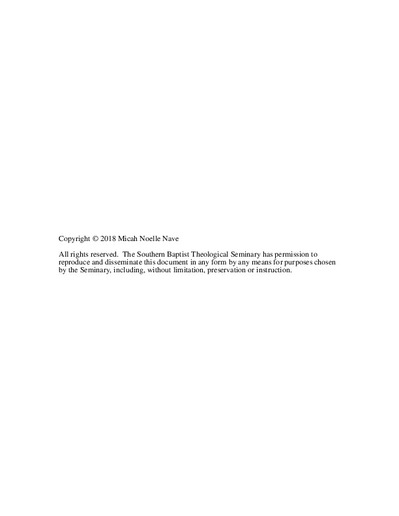An Analysis of Women’s Perception of Biblical Community Within the Environment of Facebook: A Mixed Method Study
Subject
Facebook (Electronic resource)Social media--Women
Social media--Religious aspects--Christianity
Online social networks--Religious aspects--Christianity
Fellowship--Religious aspects--Christianity
Communities--Religious aspects
Abstract
This purpose of this study was to explore the biblical community behaviors of women when engaging with Facebook as well as perceived best practices for connecting women in the church. An explanatory sequential mixed methods design was used, involving the collection of both quantitative and qualitative data. The quantitative survey, using snowball sampling, researched the biblical community habits of women when posting on Facebook. Open-ended questions allowed a qualitatively exploration of the perceived best practices among women when using Facebook as a tool for biblical community connection.
Chapter 2 reviews the pertinent literature to this study, which covers issues of virtual community, Christians and digital media, and the principles of biblical community. The principles of biblical community were developed to exist outside of a physical or virtual environment.
Chapter 3 describes the methodology and process by which the data was collected for this study. Women, ages 18 and above, engaged to some degree with someone in women’s ministry leadership, were invited via social media to participate in the adapted survey developed by Matthew Alan Vander Wiele. The participants also responded to six open-ended questions that revealed perceived best practices for connecting women using Facebook.
Chapter 4 reports the analysis of the completed survey data. An analysis of the quantitative data was then completed using the principles of biblical community assembled in the literature review. The research demonstrated the failure of women to understand what makes a community biblical. An expert panel was used to add a qualitative component to the instrument by helping to sculpt open-ended questions for the survey. Respondents answer the following questions: Do women self-report behaviors of biblical community, as outlined in Scripture, in their personal interactions on Facebook? What are the perceived best practices for connecting women in the church through Facebook according to current experience of women? The study provided insights into the community habits of women as they interact on Facebook.
The final chapter gives conclusions based on the study’s findings. Variances in the data and conceivable reasons for their presence are also surveyed. Based on the results of the research, applications are made for women, women’s ministry leaders, and women’s ministry within the local church, as well as other practitioners interested in virtual community, engaging the church through social media, and biblical community connections within a virtual setting.

